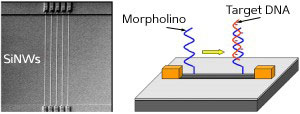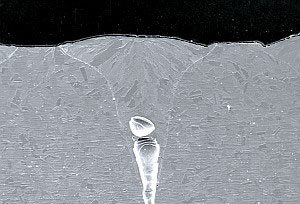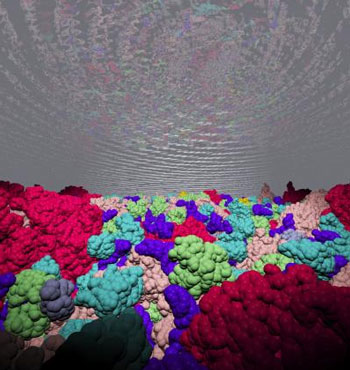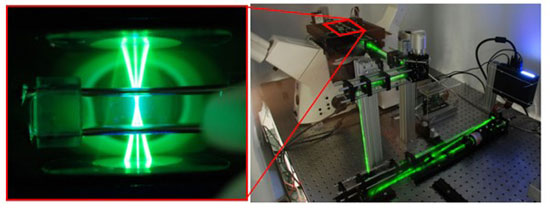'NanoMed - Toxikologische Charakterisierung von Nanomaterialien fuer die diagnostische Bildgebung in der Medizin' heisst ein neues Forschungsprojekt, das das Bundesministerium fuer Bildung und Forschung mit fast zwei Millionen Euro Gesamtvolumen finanziert.
Oct 13th, 2010
Read more
 Chitin-silicon dioxide nanocomposite made by self-organization and sol-gel chemistry.
Chitin-silicon dioxide nanocomposite made by self-organization and sol-gel chemistry.
Oct 13th, 2010
Read more
 Morpholino-based biosensors are more stable, more specific and more sensitive than conventional biosensors for DNA detection.
Morpholino-based biosensors are more stable, more specific and more sensitive than conventional biosensors for DNA detection.
Oct 13th, 2010
Read more
 New laser engraving technology can be used to make markings inside a block of stainless steel.
New laser engraving technology can be used to make markings inside a block of stainless steel.
Oct 13th, 2010
Read more
Conductive polymers are plastic materials with high electrical conductivity that promise to revolutionize a wide range of products including TV displays, solar cells, and biomedical sensors. A team of McGill University researchers now reports how to visualize and study the process of energy transport along one single conductive polymer molecule at a time, a key step towards bringing these exciting new applications to market.
Oct 13th, 2010
Read more
Researchers seek to understand similarities and differences in the plans, programs and approaches to commercialize graphene.
Oct 13th, 2010
Read more
University of California, Santa Barbara will receive almost $6.1 million over five years from the National Science Foundation (NSF) to extend support for the campus's innovative Center for Nanotechnology in Society (CNS) through 2015. The grant represents an increase of almost 21 percent from the initial funding in 2005.
Oct 12th, 2010
Read more
Scientists have observed the motion of an atom's valence or outermost electrons in real-time by investigating the ejection of an electron from an atom by an intense laser pulse.
Oct 12th, 2010
Read more
$100M initiative will create more than 100 high-tech jobs and establish New York as the global leader for the nanoelectronics' industry's transition to 450mm wafer manufacturing technology.
Oct 12th, 2010
Read more
$1.5 million DOD award allows U-M scientists to pursue new application for nanoemulsion technology.
Oct 12th, 2010
Read more
 Using large-scale computer simulations, researchers at the Georgia Institute of Technology have identified the most important factors affecting how molecules move through the crowded environment inside living cells. The findings suggest that perturbations caused by hydrodynamic interactions - similar to what happens when the wake from a large boat affects smaller boats on a lake - may be the most important factor in this intracellular diffusion.
Using large-scale computer simulations, researchers at the Georgia Institute of Technology have identified the most important factors affecting how molecules move through the crowded environment inside living cells. The findings suggest that perturbations caused by hydrodynamic interactions - similar to what happens when the wake from a large boat affects smaller boats on a lake - may be the most important factor in this intracellular diffusion.
Oct 12th, 2010
Read more
On Oct 2nd 2011, a three day global gathering of stakeholders bent on taking state of the art products incorporating micro- and nanotechnology to market will be converge on Lake Louise.
Oct 12th, 2010
Read more
Researchers in Germany are developing new, unconventional techniques in microscopy whose physical concepts are at least as exciting as their technical realisation.
Oct 12th, 2010
Read more
 Forscher der Uni Freiburg entwickeln ein neues Konzept in der Mikroskopie.
Forscher der Uni Freiburg entwickeln ein neues Konzept in der Mikroskopie.
Oct 12th, 2010
Read more
Semiconductor Research Corporation (SRC), the world's leading university-research consortium for semiconductors and related technologies, joined today with the National Science Foundation (NSF) to fund $2 million in supplemental grants for nanoelectronics research.
Oct 12th, 2010
Read more
Elsevier, publisher of scientific, technical and medical information products and services, is pleased to announce that as of January 2011 Elsevier will publish The Journal of Molecular Diagnostics (JMD) in partnership with the Association for Molecular Pathology (AMP) and the American Society for Investigative Pathology (ASIP).
Oct 12th, 2010
Read more






 Subscribe to our Nanotechnology News feed
Subscribe to our Nanotechnology News feed